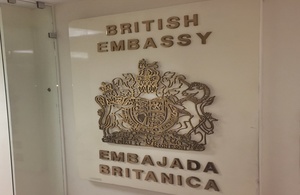Ensuring women’s full participation in peace processes: statement to the UN Security Council
Thank you. Today, we mark a great achievement, the 20th anniversary of the UN Security Council Resolution 1325.
Twenty years ago, that Resolution recognised that sustainable peace relied on inclusive peace. It provided a framework to address the disproportionate impact that fell on women and girls on the ground. And it advocated for their meaningful inclusion as agents of change.
As a global force for good, the UK has been proud to lead the way on the Women, Peace and Security agenda as penholder for Resolution 1325. We work with governments and non-governmental organisations (NGOs) around the world to share good practice and expertise, such as supporting those brave women who are resolving conflict, countering violent extremism, and building peace at the grassroots level.
As proud champions of the Women, Peace and Security agenda we will not accept any roll-back of the progress made on women’s rights over the last 20 years.
There are 10 UN Security Council resolutions dedicated to advancing this agenda. We must ensure those resolutions are taken seriously and implemented fully. We are not prepared to unpick the framework that has been so hard-fought.
This is only right. We owe it not only to women, but to global peace.
Women’s rights are human rights. And it is not a matter up for discussion.
As we look ahead to the next 20 years, we must reflect on the challenges before us. Because the truth is that despite our best intentions, we face a widening implementation gap.
But the UK is working hard to bridge the gap, and welcomes others to join us in doing so.
We fully support women’s meaningful participation in peace processes. And that is why I’m proud to announce that the UK is dedicating £1 million of funding to Women Mediators across the Commonwealth Network. Their vital work increases the recognition of the role of women mediators in peace processes, from local to global, ensuring they get the acknowledgement, respect and support they deserve.
We also continue to support the Elsie Initiative for women in peace operations.
The voices of women peacebuilders must be heard and amplified. But for many, speaking up and carrying out their vital work comes at great personal risk. No woman should have to risk her safety to heal her community.
That is why I am proud that the UK has supported the International Civil Society Action Network in developing the Protection Framework for women peacebuilders. This vital piece of work provides guidance to states and multilateral organisations on how best to prevent and respond to reprisals.
And I am pleased to announce that the UK will formally commit to supporting this framework and its recommendations. I urge others to do the same.
It is not only the voices of women, but ethnic, religious, sexual, and disabled minorities who are silenced. The deadline for the Sustainable Development Goals is only 10 years away – we must hear diverse voices at all levels.
We also face additional threat from COVID-19. It has laid bare many inequalities. But the most disproportionate impact is on women and girls. The impact will be felt for years to come and threaten hard-won progress on gender equality.
Which is why I am proud to announce that, along with Gender Action for Peace and Security and partners, the UK is committing £250,000 funding to undertake research on the gendered impacts of COVID-19 in fragile and conflict affected states. This vital research will help ensure that the needs of women and girls are considered in any future crisis response.
Because ultimately, peace is not a finished product or a final result. It is a continuous effort. So I call on all our partners to continue to push for real progress on this vital agenda.
It is time to turn intentions into actions – for the next 20 years and, indeed, for future decades to come.
